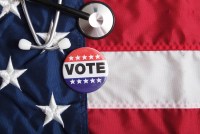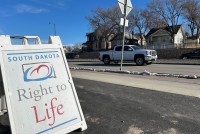Latest KFF Health News Stories
Operating in the Red: Half of Rural Hospitals Lose Money, as Many Cut Services
A recent report finds half of America’s rural hospitals are losing money, and many are struggling to stay open. Researchers and advocates worry the hospitals’ financial spiral will have immediate and long-term health effects on their communities.
Why Hospitals in Many States With Legal Abortion May Refuse To Perform Them
Many states that tout themselves as protectors of reproductive health care, including California, Michigan and Pennsylvania, have little-noticed laws on the books protecting hospitals that refuse to provide it. The laws shield at least some hospitals from liability for not providing care they object to on religious grounds, leaving little recourse for patients. The providers — many of them […]
America Worries About Health Costs — And Voters Want to Hear From Biden and Republicans
The presidential election is likely to turn on the simple question of whether Americans want Donald Trump back in the White House. But health care tops the list of household financial worries for adults from both parties.
California Pushes to Expand the Universe of Abortion Care Providers
A new California law allows trained physician assistants, also called physician associates, to perform first-trimester abortions without the presence of a supervising doctor. The legislation is part of a broader effort by the state to expand access to abortion care, especially in rural areas. Some doctor groups are wary.
Avanzan en varios estados proyectos de ley extremos sobre el uso de baños por género
Al menos uno de los proyectos de ley es tan extremo como para proponer que se considere delito que una persona transgénero entre en una instalación que no coincida con el sexo indicado en su acta de nacimiento.
What the Health? From KFF Health News: Alabama’s IVF Ruling Still Making Waves
Lawmakers in Congress and state legislatures are scrambling to react to the ruling by the Alabama Supreme Court that frozen embryos created for in vitro fertilization are legally children. Abortion opponents are divided among themselves, with some supporting full “personhood” for fertilized eggs, while others support IVF as a moral way to have children. Rachel Cohrs of Stat, Riley Griffin of Bloomberg News, and Joanne Kenen of the Johns Hopkins University schools of nursing and public health and Politico Magazine join KFF Health News’ Julie Rovner to discuss these issues and more. Also this week, Rovner interviews University of Pittsburgh law professor Greer Donley, who explains how a 150-year-old anti-vice law that’s still on the books could be used to ban abortion nationwide. Plus, for “extra credit,” the panelists suggest health policy stories they read this week that they think you should read, too.
Bathroom Bills Are Back — Broader and Stricter — In Several States
State lawmakers are resurrecting and expanding efforts to prohibit transgender people from using public restrooms and other spaces that match their gender. Some have sought to ban trans people from “sex-designated spaces,” including domestic violence shelters and crisis centers, which experts say could violate anti-discrimination laws and jeopardize federal funding.
Si eres pobre, un tratamiento de fertilidad suele ser un sueño inaccesible
Pero las personas con ingresos más bajos, a menudo de minorías, tienen más probabilidades de estar cubiertas por Medicaid o por seguros limitados que no tienen esta cobertura.
A Government Video Would Explain When Abortion Is Legal in South Dakota
South Dakota allows doctors to terminate a pregnancy only if a patient’s life is in jeopardy. Lawmakers say a government-created video would clarify what that exception actually means.
If You’re Poor, Fertility Treatment Can Be Out of Reach
For low-income people who are on Medicaid or whose employer health plan is skimpy, help for infertility seems unattainable.
Pregnancy Care Was Always Lacking in Jails. It Could Get Worse.
A lack of oversight and standards for pregnancy care in jails is becoming more problematic as the number of incarcerated women rises and abortion restrictions put medical care further out of reach.
What the Health? From KFF Health News: Alabama Court Rules Embryos Are Children. What Now?
In a first-of-its-kind ruling, the Alabama Supreme Court has determined that embryos created for in vitro fertilization procedures are legally people. The decision has touched off massive confusion about potential ramifications, and the University of Alabama-Birmingham has paused its IVF program. Meanwhile, former President Donald Trump is reportedly planning to endorse a national 16-week abortion ban, while his former administration officials are planning further reproductive health restrictions for a possible second term. Lauren Weber of The Washington Post, Rachana Pradhan of KFF Health News, and Victoria Knight of Axios join KFF Health News’ Julie Rovner to discuss these issues and more. Plus, for “extra credit,” the panelists suggest health policy stories they read this week that they think you should read, too.
Nikki Haley Wants ‘Consensus’ on Contraception. It’s Not That Easy.
Nikki Haley, the last candidate standing between Donald Trump and the GOP presidential nomination, insists that being “unapologetically pro-life” doesn’t make her anti-birth control. “Let’s find consensus,” she urged at a GOP presidential debate in November. “Let’s make sure we make contraception accessible.” If only consensus were that easy. In some conservative circles, contraception is […]
The Powerful Constraints on Medical Care in Catholic Hospitals Across America
The expansion of Catholic hospitals nationwide leaves patients at the mercy of the church’s religious directives, which are often at odds with accepted medical standards.
What the Health? From KFF Health News: Biden Wins Early Court Test for Medicare Drug Negotiations
A federal district court judge dismissed a lawsuit attempting to invalidate the Biden administration’s Medicare prescription-drug price negotiation program. But the suit turned on a technicality, and several more court challenges are in the pipeline. Meanwhile, health policy pops up in Super Bowl ads, as Congress approaches yet another funding deadline. Alice Miranda Ollstein of Politico, Lauren Weber of The Washington Post, and Rachel Cohrs of Stat join KFF Health News’ Julie Rovner to discuss these issues and more. Plus, for “extra credit,” the panelists suggest health policy stories they read this week they think you should read, too.
For the first time, a jury has convicted a parent of a school shooter of charges related to the child’s crime, finding a mother in Michigan guilty of involuntary manslaughter and possibly opening a new legal avenue for gun control advocates. Meanwhile, as the Supreme Court prepares to hear a case challenging the FDA’s approval of the abortion drug mifepristone, a medical publisher has retracted some of the journal studies that lower-court judges relied on in their decisions. Alice Miranda Ollstein of Politico, Sarah Karlin-Smith of the Pink Sheet, and Rachana Pradhan of KFF Health News join KFF Health News’ Julie Rovner to discuss these issues and more. Plus, for “extra credit,” the panelists suggest health policy stories they read this week that they think you should read, too.
Even in Bright-Blue California, Abortion Is on the Ballot
The race to replace the late Democratic Sen. Dianne Feinstein is in full swing in California. Although the state enshrined abortion rights into its constitution, the prospect of a national abortion ban has the candidates vying for a Senate seat putting a spotlight on reproductive rights. Or, at least the Democrats are. Steve Garvey, a […]
What the Health? From KFF Health News: The Struggle Over Who Gets the Last Word
As science skepticism pervades politics, the Supreme Court will soon consider two cases that seek to define the power of “experts.” Meanwhile, abortion opponents are laying out plans for how Donald Trump, if reelected as president, could effectively curtail abortion even in states where it remains legal. Sandhya Raman of CQ Roll Call, Joanne Kenen of Johns Hopkins University and Politico Magazine, and Sarah Karlin-Smith of the Pink Sheet join KFF Health News’ Julie Rovner to discuss these issues and more. Also this week, Rovner interviews Samantha Liss, who reported and wrote the latest KFF Health News-NPR “Bill of the Month” feature about a husband and wife who got billed for preventive care that should have been fully covered.
More ‘Navigators’ Are Helping Women Travel to Have Abortions
After the U.S. Supreme Court ended the federal right to an abortion and many states banned the procedure, reproductive health care organizations hired dozens of people to help patients arrange travel and pay for care.
What the Health? From KFF Health News: Health Enters the Presidential Race
New Hampshire voters have spoken, and it seems increasingly clear that this November’s election will pit President Joe Biden against former President Donald Trump. Both appear to be making health a key part of their campaigns, with Trump vowing (again) to repeal the Affordable Care Act, and Biden stressing his support for contraception and abortion rights. Meanwhile, both candidates will try to highlight efforts to rein in prescription drug prices. Alice Miranda Ollstein of Politico, Anna Edney of Bloomberg News, and Jessie Hellmann of CQ Roll Call join KFF Health News chief Washington correspondent Julie Rovner to discuss these issues and more. Also this week, Rovner interviews Sarah Somers of the National Health Law Program about the potential consequences for the health care system if the Supreme Court overturns a key precedent attempting to balance executive vs. judicial power.

















